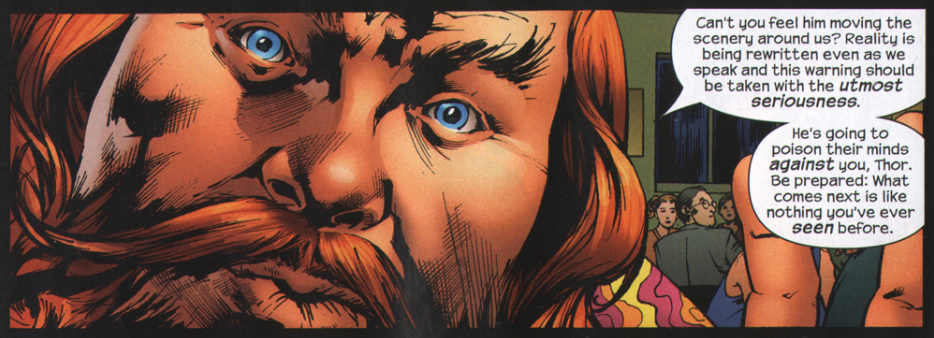Loki/Moriarty: Epic trickster shit in two recent revisions
By coincidence I had just read Vol 2 of The Ultimates, Marvel’s George W. Bush-era reboot of The Avengers, a couple days before I watched the 6th episode of Sherlock, the new BBC updating of Sherlock Holmes. *** SPOILERS AHEAD **** They feature an identical narrative trope that strikes me as requiring exquisite writers’ craft to carry off: a great hero is disgraced in the public eye by his counterpart/ nemesis: an evil genius who inverts perceived reality so convincingly that the reader and even the hero himself begin to doubt the original narrative. The story is rewritten before our eyes, as a magician flips a line of red cards over to black.
Andrew Scott as Moriarty; Loki by Bryan Hitch and Paul Neary
The Reichenbach Fall, based loosely on Arthur Conan Doyle’s death-of-Sherlock story The Final Problem, has Moriarty performing uncanny acts of creation: kidnapping and brainwashing children, falsification of documents, seduction of the press, the invention of a second persona (a children’s TV actor, no less)—all in order to persuade the world that Holmes is a fraud who invents the cases he pretends to solve. Moriarty claims the author’s mantle explicitly, telling Holmes he is writing a fairy tale for the tabloid swilling masses, and strewing fairy tale tchotchkes along the path of Holmes’ narrative.
The totalizing perversity of Moriarty’s plan is unveiled when Holmes and Watson burst into the journalist’s apartment, and find Moriarty, shockingly, just THERE, exposed and helpless. But Moriarty is not Moriarty. In a scene played beautifully by Andrew Scott, Moriarty, the ill-used children’s actor, cringes away from Holmes and we see, along with Holmes, how perfectly this new version of reality fits all the facts we know.
Thor the superhero is, like his Norse inspiration, God of Thunder and Son of Odin. His half-brother is Loki: God of Mischief, deceiver, perpetual pain in Thor’s ass. In the scientific fantasy present of The Ultimates, in which extraordinary abilities are created through chemistry and prosthetics, this theological basis for superpowers has the odd but distinct effect of seeming implausible. Author Mark Millar exploits this to great advantage by casting doubt on Thor’s divinity throughout both volumes of his and artist Bryan Hitch’s The Ultimates (Joss Whedon’s Avengers movie is sort of the Disney version of this comic book). [note: I wrote this before Disney actually bought Marvel. In the old days, “Disney” used to be shorthand for “sunny, sentimental, sanitized, simplified”]
Early in volume 2, this question takes center stage. Thor, youth-cult messiah and public opponent of the neocon agenda, receives a visit from Volstagg of Asgard, a comic foil in the original Kirby-Lee comics. Millar & Hitch give him a little more gravity in a wonderful paradigm-disrupting meal scene. Volstagg has a message from Odin: “…your brother has escaped from the Room Without Doors” –better get Sherlock on that!– “and swears vengeance for your last encounter.” Thor pooh-poohs the threat. After all, he always beats Loki –but Volstagg insists that this time is different. “Can’t you feel him moving the scenery around us? Reality is being rewritten even as we speak”. Indeed, by the end of the meal no one else can see Volstagg and Thor is told that his raving is disturbing the other diners.
From The Ultimates 2, Vol. 1; copyright Marvel Entertainment
In short order Loki, disguised as a scientist, has persuaded Nick Fury and all the other Ultimates/Avengers that Thor is just a delusional Norwegian hippie who has stolen some spectacularly advanced weapons technology. Thor is stripped of allies and soon brought low in a concerted attack, which begins with Captain America burning off his long hair with a flamethrower like a militarized Mitt Romney. Loki’s narrative will predominate for most of the book, causing one hero after another to fall at the hands of their own comrades. More here than in Sherlock, the entranced reader is uncertain at every turn. We are like a college sophomore suddenly exposed to Noam Chomsky. Should we fight to believe in the reality we’ve inherited, or switch allegiance to reality’s negative?

